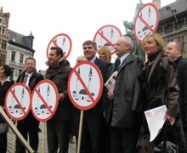 Far-right groups are calling for a ban on the building of new mosques as part of a new campaign to stop the spread of radical Islam in Europe. Belgium’s far-right Vlaams Belang party teamed up with radical groups from Austria and Germany on Thursday to launch a Charter to “fight the Islamisation of West-European cities”.
Far-right groups are calling for a ban on the building of new mosques as part of a new campaign to stop the spread of radical Islam in Europe. Belgium’s far-right Vlaams Belang party teamed up with radical groups from Austria and Germany on Thursday to launch a Charter to “fight the Islamisation of West-European cities”.
“We are not opposed to freedom of religion but we don’t want Muslims to impose their way of life and traditions over here because much of it is not compatible with our way of life,” Vlaams Belang’s Filip Dewinter told Radio Netherlands Worldwide. “We can’t accept headscarves in our schools, forced marriages and the ritual slaughter of animals.”
In particular, the coalition called for a moratorium on new mosques, which they say “act as catalysts for the Islamisation of entire neighbourhoods.”
“We already have over 6,000 mosques in Europe, which are not only a place to worship but also a symbol of radicalisation, some financed by extreme groups in Saudi Arabia or Iran,” Mr Dewinter explained, citing a large new mosque being built in the Dutch port city of Rotterdam. “Its minarets are six floors high, higher than the illuminations of the Feyenoord soccer stadium!” he cried. “These kinds of symbols have to stop.”
However, it is unclear how the group plans to tackle perceived threats such as the teaching of the Koran, apart from holding rallies in European cities with high immigrant populations.
Aside from Austria’s Freedom Party (FPÖ), there was a notable absence of other political heavyweights during the press conference in the Flemish city of Antwerp. A spokesman for Italy’s Allianza Nazionale said he was unaware of the Charter, though his party too was looking at the issue of the new mosques. Dutch right-wing maverick politician Geert Wilders, who is currently producing a film about the danger of the Koran, also stayed away.
But Mr Dewinter seems unruffled by the paltry political support: “This movement may be small today but I am convinced it will grow into something major.”
